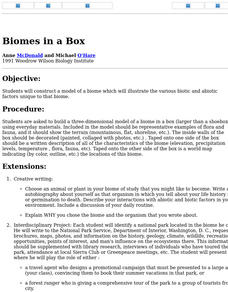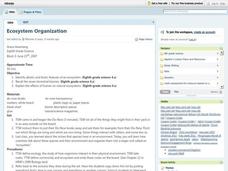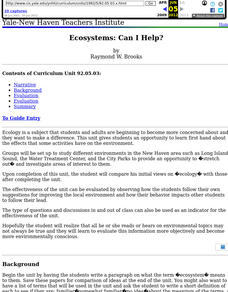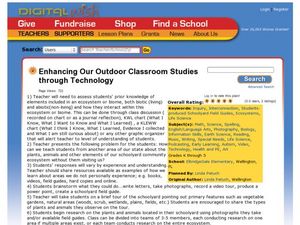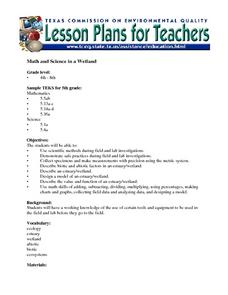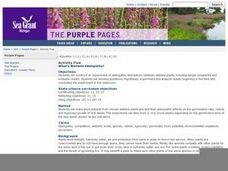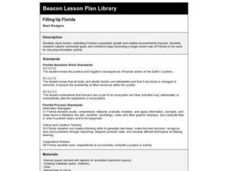Curated OER
Biomes in a Box
Students construct a three-dimensional model of a biome which illustrates the various biotic and abiotic factors unique to that biome. They use everday materials to represent the important characteristics of a particular biome and then...
Curated OER
Ecosystem Organization
Eighth graders engage in a lesson about ecosystems with the intention of looking at how it is organized. They cover the biotic and abiotic factors of an ecosystem while looking at the seven types of terrestrial biomes. Students write...
Curated OER
Vocabulary: Kansas Prairies
Students explore the ecosystem by reviewing scientific vocabulary terms. In this environmental awareness activity, students identify the differences between abiotic and biotic factors and their relationship to the Earth. Students define...
Curated OER
Ecosystems: Can I Help?
Students study how some activities effect the environment and ecosystems.
Curated OER
What Is In The Water?
Students investigate the biotic and abiotic factors that are found in an aquatic ecosystem. The emphasis is upon the investigation of present an projections of future water quality. Then students visit a local body of water to gather...
Curated OER
Enhancing Our Outdoor Classroom Studies through Technology
Combine science, math, and more using this resource. Learners use technology to share video and other information about their community with people throughout the state. They learn about the environment, identifying native plants, record...
Curated OER
Leaf Pack Study
Students conduct an experiment using leaf packs. In this leaf lesson plan students complete an activity in groups and complete a handout.
Curated OER
Flowering Phenology: How Do Plants Know When to Flower?
Students study the process of plant reproduction and the biotic and abiotic factors that affect flowering phenology. In this plant reproduction lesson, students describe the interaction of environmental factors as it relates to...
Curated OER
Plants and Ecosystems
The relationships within and between ecosystems can be explored. after examining an area for living and non-living things students complete the same examination in the forest ecosystem. Students identify abiotic and biotic elements in an...
Curated OER
What Is Natural?
Your junior highers will learn about which objects are natural and classify objects as abiotic or biotic. Your class will trace human products to their natural resources using matter cycles and then create their own definition of nature.
Chicago Botanic Garden
Ecological Mismatches
Modeling is a powerful teaching tool. The final installment in a six-part series has pupils complete an activity to model a food web and discover the interconnected relationships in an ecosystem. They then read about changes in migratory...
Curated OER
Organisms and Their Environment
In this organisms and their environment worksheet, students will review concepts relating to ecological studies, levels of organization in ecology, and relationships between organisms in ecosystems. This worksheet has 10 fill in the...
Curated OER
Counting Animal Populations
Students learn how to count animal populations by the Mark and Recapture method. In this counting animal populations lesson plan, students begin by predicting amounts of different candies in a jar. Students then simulate using beans, two...
Curated OER
Ecology: Factors Influencing Animal Populations
Students assess the factors affecting animal populations. Working in groups they define specific vocabulary terms and complete several activities from "Project Wild."
Curated OER
Math and Science in a Wetland
Students describe safe practice when doing field and lab investigations in a estuary or wetland. They create a model of an estuary and describe their value and function. They participate in field study in which they collect and analyze...
Curated OER
Principles of Ecology
In this ecology worksheet, students will fill in a graphic organizer showing the relationship organisms have with their environments and with each other. This includes biotic and abiotic factors, tropic levels, and ecological pyramids....
Curated OER
Sand Travels
Students examine how sand is formed by erosion and that it can be moved by streams, rivers, and ocean currents in this unit of lessons. They study waves and currents, and structures that change how sand moves by creating story charts,...
Curated OER
Ecosystems
With a variety of multiple choice and short answer questions, the handout found here could be used in many ways in the classroom: pretest/posttest, study guide, reading guide, or entry/exit questions. There is not a lot of space for...
Curated OER
A Walk in the Woods
Eighth graders observe and identify the different levels of the forest. In this forest zones lesson students observe, identify and name a variety of forest components and describe how humans impact the forest ecosystem.
Curated OER
What Should I Know about Biosphere?
If your class is learning about the biosphere, you may find a study guide or reading guide helpful. Focusing on vocabulary, processes, and interactions, the Word document is easy to edit as needed to fit your needs. Another great option...
Curated OER
Native Species Restoration: Is Saving One Species Hurting Another?
Students investigate the effect of human activities upon the environment. The studying experience encourages students to think about the issues involved in native species restoration.
Curated OER
What's Wetland Allelopathy?
Students study plants and what they need to thrive and survive. They make plant extracts from chosen wetland plants and test their allelopathic effects on the germination rate, radicle growth, and hypocotyl growth of test seeds of other...
Curated OER
A Limnology Study of Drainage Ditches
Students chemically test water, observe microscopic organisms in the classroom, and screen the sample for macroinvertebrates. They design a reporting sheet that list all the items to be tested and a space to record the results.
Curated OER
Filling Up Florida
Students study factors controlling Florida's population growth and related environmental impacts. They research natural community types and construct maps (including a large-sized map of Florida) to be used for a simulation activity.


